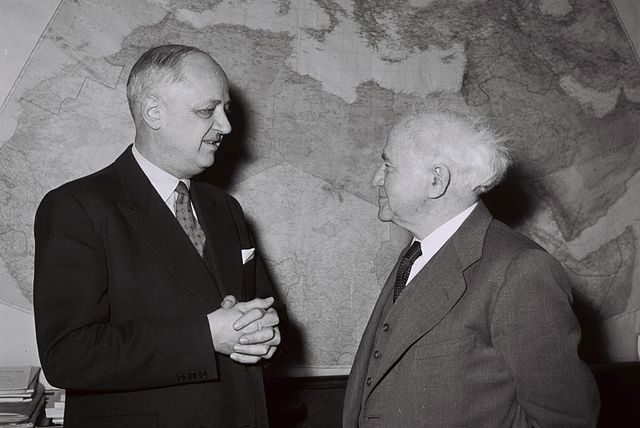Christian Pineau
French Resistance fighter From Wikipedia, the free encyclopedia
Christian Pineau (French pronunciation: [kʁistjɑ̃ pino]; 14 October 1904 – 5 April 1995)[1] was a noted French Resistance fighter, who later served an important term as Minister of Foreign Affairs from 1956 through 1958.
Christian Pineau | |
|---|---|
 Pineau in 1957 | |
| Minister of Foreign Affairs | |
| In office 1 February 1956 – 14 May 1958 | |
| Prime Minister | René Coty |
| Preceded by | Antoine Pinay |
| Succeeded by | René Pleven |
| Personal details | |
| Born | 14 October 1904 Chaumont-en-Bassigny, Haute-Marne, France |
| Died | 5 April 1995 (aged 90) Paris, Ile de France, France |
| Relations | Jean Giraudoux (stepfather) |
Life and career
Summarize
Perspective
Pineau was born in 1904 in Chaumont-en-Bassigny, Haute-Marne, France.[1] His father was a colonel in the French Army died when he was a young child.[1] His mother married again to the French playwright Jean Giraudoux.[1] Later, Christian Pineau would say that it was Giraudoux who gave him his love of writing.[citation needed] He was educated at the École alsacienne in Paris and graduated with degrees in law and in political science.[2] In 1931 he joined the staff of the Bank of France, and later worked for the Banque de Paris et des Pays-Bas.[2] In 1937 he founded the journal Banque et Bourse.[2]
A World War II French Resistance leader who established a network called Phalanx, Pineau helped found the underground newspaper Libération.[1][2] He was a close ally of Charles de Gaulle and went on dangerous secret missions passing communications between occupied France and the Free France headquarters in London.[1] He was arrested by the Gestapo in September 1942 but escaped.[2] He was arrested again in 1943 and evaded a death sentence through forged identity papers which hid his true identity.[1] He was sent to the Buchenwald concentration camp, and remained there until it was liberated by American soldiers in 1945.[1][2]
Pineau represented the Sarthe department as a Socialist in the French National Assembly from 1946 to 1958.[2] After the war, he served as a minister in French governments, 1945–1958.[2] He was minister of supply in Charles de Gaulle's government (1945) and minister of public works (1947–1950) in various governments.[2]

Pineau was finance minister for a short time in 1948.[citation needed] He was designated as prime minister of France by President René Coty after the February 1955 resignation of Pierre Mendès-France, but the National Assembly refused to ratify his cabinet by 312 votes against 268; his prime ministership lasted for two days between 17 and 19 February 1955.[citation needed]
As foreign minister (February 1956 – May 1958), Pineau was responsible for handling the Suez crisis and for signing the Treaty of Rome on behalf of France.[2] With Guy Mollet, he visited Moscow.[citation needed] In October 1956, he signed the Protocol of Sèvres with Great Britain and Israel on behalf of France.[2]
Pineau was a lifelong advocate of European integration.[citation needed]
Pineau is buried in the Père Lachaise Cemetery, Paris.[citation needed]
Bibliography
Pineau wrote several political books and memoirs:
- La simple vérité, regard sur la période 1940–1945 (the simple truth, a view of the period 1940–45), Editions Julliard
- Khrouchtchev (Khrushchev) Perrin, 1964
- Suez, Robert Laffont, 1976
- Mon cher député, Julliard, 1959
- Le grand pari, l'aventure du Traité de Rome (with Christiane Rimbaud)
He also wrote children's books:
- Plume et le saumon (Feather and the salmon)
- L'ourse aux pattons verts (The she-bear with green paws)
- Histoire de la forêt de Bercé (Story of the Bercé forest)
- La planète aux enfants perdus (The planet of lost children)
References
Wikiwand - on
Seamless Wikipedia browsing. On steroids.
